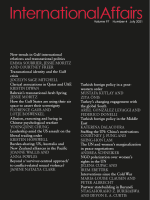Interventions by the global North since the Cold War
International interventions have undergone major changes since the Cold War. Senior researchers Maria-Louise Clausen and Peter Albrecht explore these changes and identify three phases – integration, replacement, and delegation - from the global North's failure to transform fragile states into liberal democratic polities and changes to intervention practices in response to that failure.
The first phase, following the end of the Cold War, was driven by an unfettered belief in the liberal peace thesis that led to interventions characterized by an international belief in the global South’s desire to transform and the global North’s ability to foster change.
This changed with 9/11, leading to the second phase, where the focus shifted towards extensive statebuilding exercises to replace - by force, if necessary - security sectors and reconstruct failed states as liberal democracies.
The current phase is more fragmented and reflects lost faith in the global North's transformative potential following experiences in Iraq and Afghanistan. New forms of intervention from a distance have emerged, relying on delegation to technology and militaries of the global South. This type of intervention allows the global North to maintain a sense of influence while shifting the burden of intervention onto the global South's populations and militaries—and foreclosing comprehensive statebuilding.
The article concludes that the global North can no longer claim to act on behalf of universally applicable norms, but alternatives have yet to materialize, leaving interventions in an ideological limbo.
DIIS Experts



